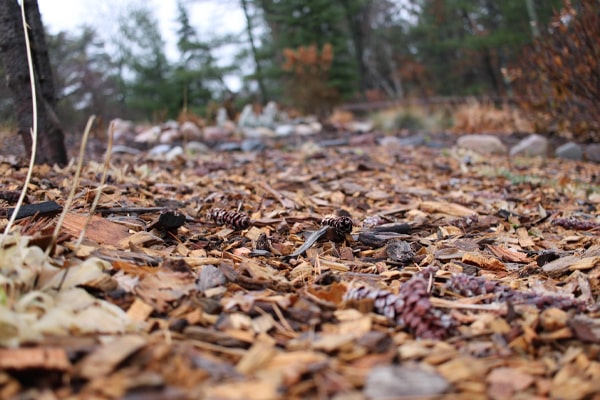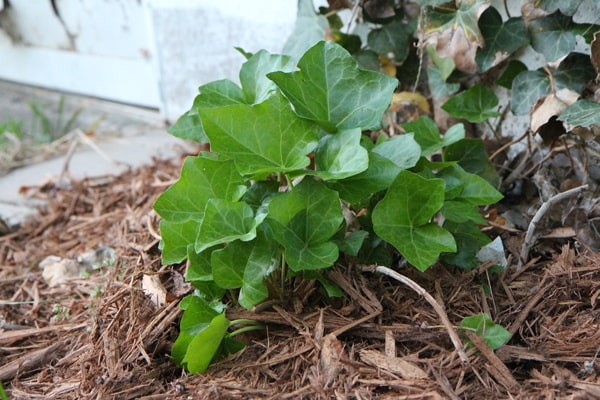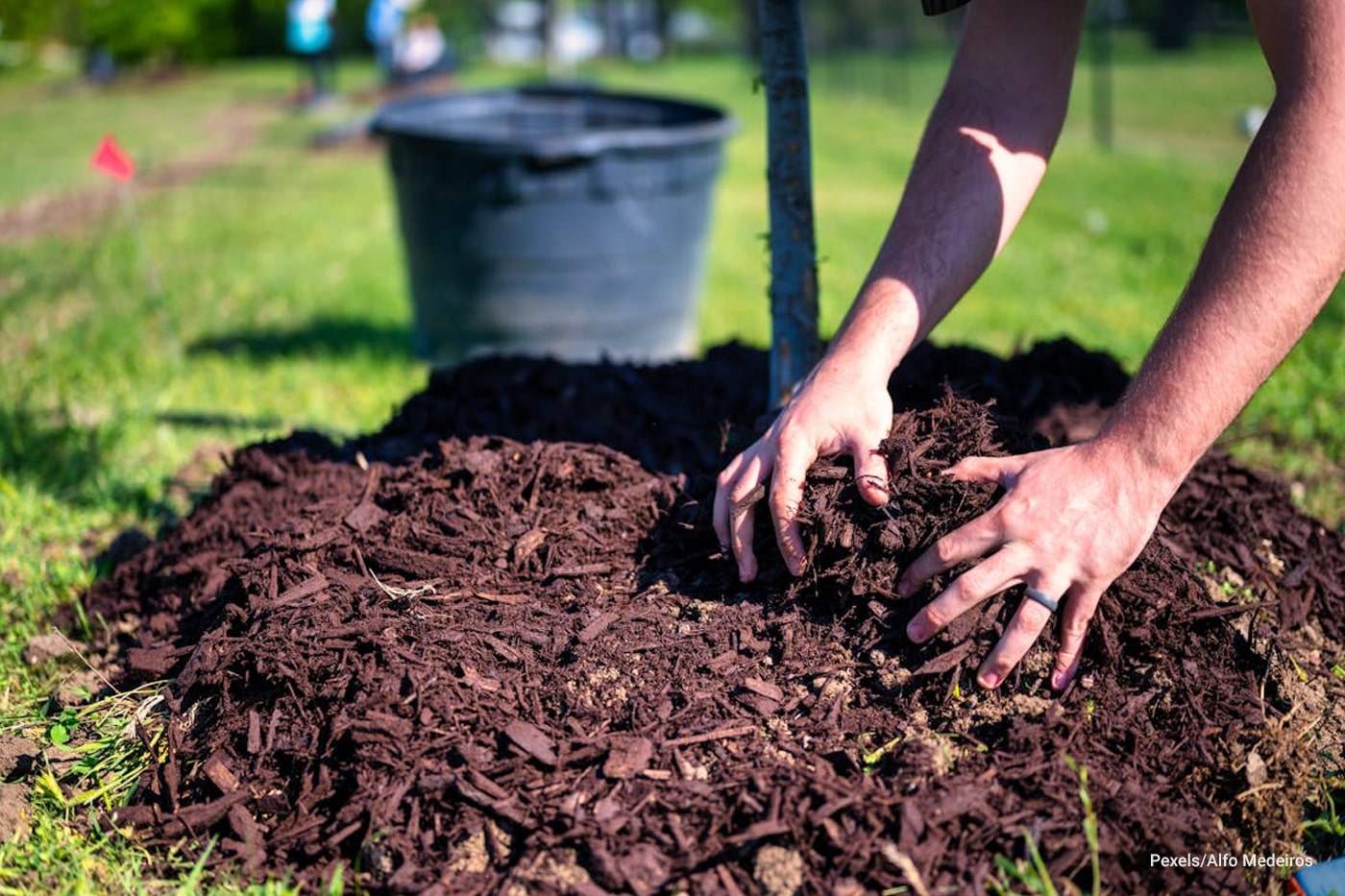Mulching is an all-natural way of suppressing weeds.
Weeds need sunlight to grow, just like plants do. When you spread mulch around your plants, it creates a barrier that blocks sunlight from reaching weed seeds buried in the soil. Under a layer of mulch, weed seeds can’t germinate.
If you already have some pesky weeds sprouting all over the garden, laying down a thick layer of mulch can suffocate them, preventing them from getting the air and nutrients they need to survive.
And here’s the best part: as mulch breaks down over time, it adds nutrients to the soil, making it richer and more fertile for your plants. This helps your plants grow bigger and stronger, making it even harder for weeds to grow and take over your garden.
Contents []
What is the best mulch for weed suppression?

When it comes to keeping weeds away from your garden, choosing the right mulch can make a big difference. Here are five types of mulch that are great for suppressing weeds:
Compost: Compost is made from all the bits of organic matter you might otherwise throw away, like kitchen scraps, leaves, and grass clippings. When spread over your garden beds, compost not only feeds your plants with essential nutrients but also creates a thick layer that blocks sunlight from reaching weed seeds. Without sunlight, weeds struggle to grow and take root. As compost breaks down, it continues to enrich the soil, providing a long-term solution for both plant health and weed control.
Shredded Bark Mulch: Shredded bark mulch is made from the bark of trees, and it’s one of the most popular types of mulch for weed suppression. It forms a thick layer on top of the soil, blocking sunlight from reaching weed seeds below. Without sunlight, the seeds can’t sprout and grow into weeds. Plus, shredded bark mulch breaks down slowly, so it can last a long time in your garden.
Hay Mulch: Hay mulch is another excellent option for keeping weeds at bay. It’s made from dried grasses, and when spread over the soil, it forms a dense covering that makes it hard for weeds to take root. Like shredded bark mulch, hay mulch blocks sunlight and helps retain moisture in the soil, creating an environment that’s not very welcoming to weeds.
Straw Mulch: Similar to hay mulch, straw mulch is made from dried straw. It’s lightweight and easy to spread, making it a convenient option for weed suppression. When applied thickly, straw mulch forms a barrier that prevents weed seeds from germinating. Plus, as it breaks down, it adds nutrients to the soil, which can benefit your plants.
Grass Cuttings: Grass cuttings are a natural mulch that many people already have readily available in their gardens. Instead of throwing away your grass clippings after mowing the lawn, you can use them to suppress weeds in your garden beds. Simply spread a layer of grass cuttings over the soil around your plants. Grass cuttings decompose quickly, so you may need to replenish them more often than other types of mulch, but they can be very effective at keeping weeds down.
Leaf Mulch and Compost: Combining leaf mulch and compost in a thick layer creates a protective barrier that inhibits weed growth. On the garden beds, add a layer of compost, then top with a thick layer of shredded dry leaves. Both materials are made from natural materials, so they break down gradually and add nutrients back into the soil.
Newspaper or cardboard: These household items aren’t just for reading or packaging. When layered thickly over the soil, newspaper or cardboard acts as an effective weed barrier. They block sunlight and prevent weed seeds from germinating and reaching the surface. Over time, they decompose, adding organic matter to the soil and improving its structure.
Living Mulch: Unlike traditional mulches that are laid on the soil’s surface, living mulches are plants themselves. Low-growing plants like clover, creeping thyme, or even certain types of grasses are planted between your main crops. These living mulches form a dense ground cover that competes with weeds for resources such as space, water, and nutrients. As a result, they not only suppress weed growth but also contribute to soil health and biodiversity, creating a thriving ecosystem in your garden.
Besides weed suppression, what are the effects of mulching in the garden?

Mulching offers more benefits beyond just keeping weeds away. Here are some other positive effects of mulching:
- Mulch acts like a blanket, helping the soil retain moisture. It prevents water from evaporating too quickly, which means your plants stay hydrated for longer periods. This is especially helpful during hot and dry weather when plants can easily become parched. Plus, when it rains or you water your garden, the mulch acts like a sponge, soaking up the water and releasing it slowly into the soil.
- Mulch acts as insulation for the soil, keeping it cooler in hot weather and warmer in cold weather. This helps to maintain a more stable environment for plant roots, which can be sensitive to extreme temperatures. Additionally, consistent soil temperatures promote healthier root development and overall plant growth.
- Mulch helps to protect the soil from erosion caused by wind and water. The layer of mulch acts as a barrier, reducing the impact of heavy rain and preventing soil from being washed away. This is particularly important in sloped areas where erosion can be a significant problem.
- Over time, organic mulches like shredded bark, wood chips, and compost break down and decompose. As they do, they release valuable nutrients into the soil, enriching it and improving its overall quality. This nutrient-rich soil promotes healthier plant growth and fosters a thriving ecosystem beneath the surface.
A great alternative to natural mulch is using weed barrier landscape fabric. It works the same way as organic mulch – blocking the sunlight to keep weeds from growing and taking over the garden without using herbicides while keeping the soil moist. Landscape fabric is often sold in rolls so you can cover a bigger area with less time and effort.
If you haven’t tried mulching or using landscape fabric to keep weeds at bay, this is the sign you’ve been waiting for!
Mulching and installing landscape fabric are effective ways to keep your garden free from weeds without using harmful chemicals. These strategies also improve the overall look of the garden, making the space look organized and neat with minimal effort.



